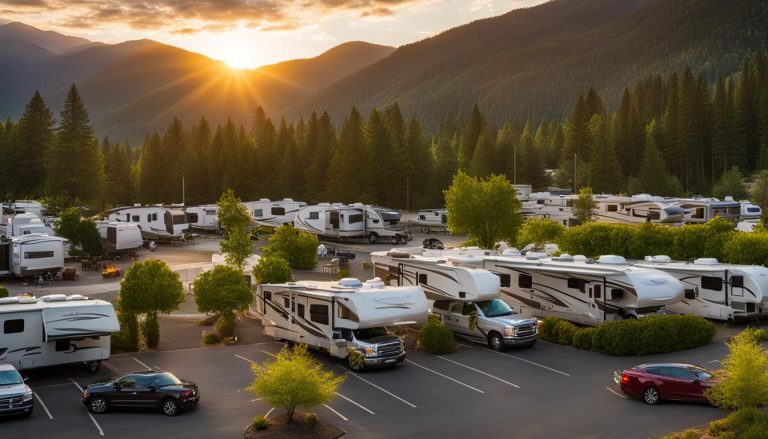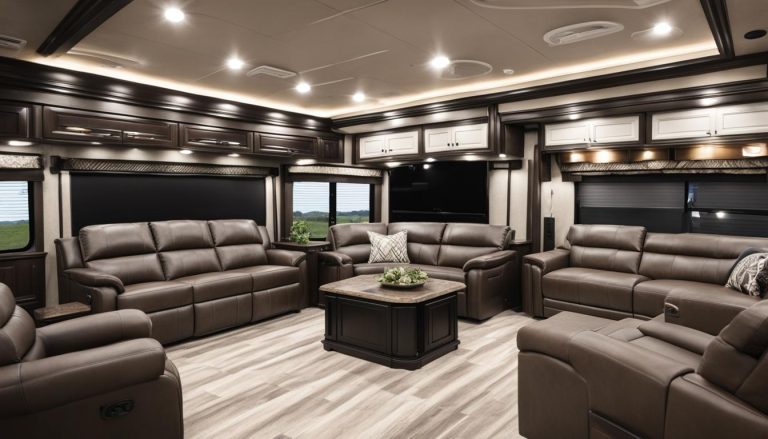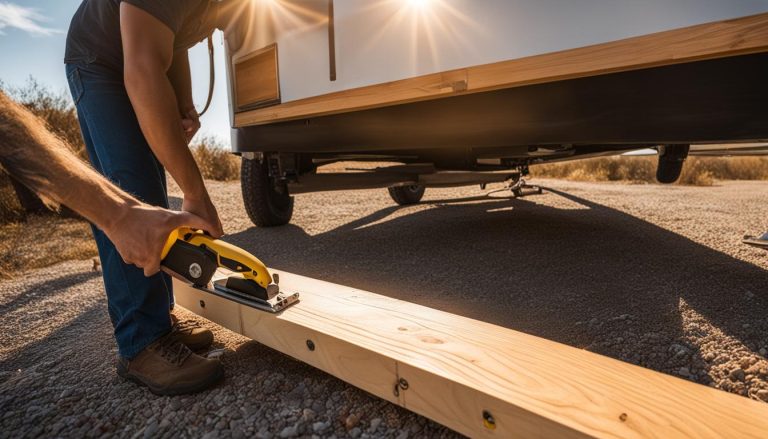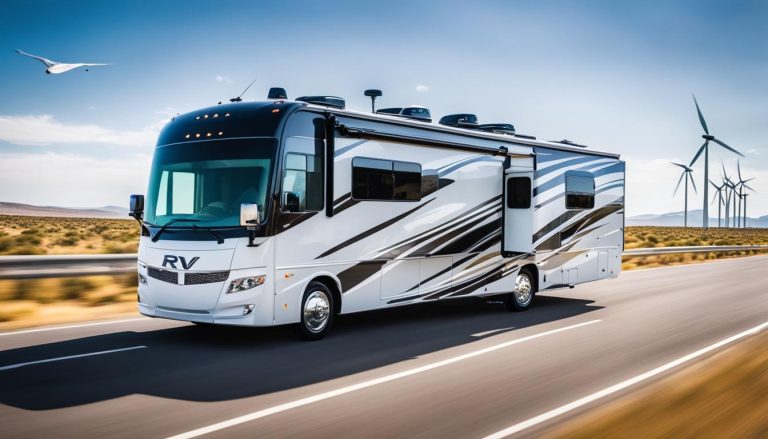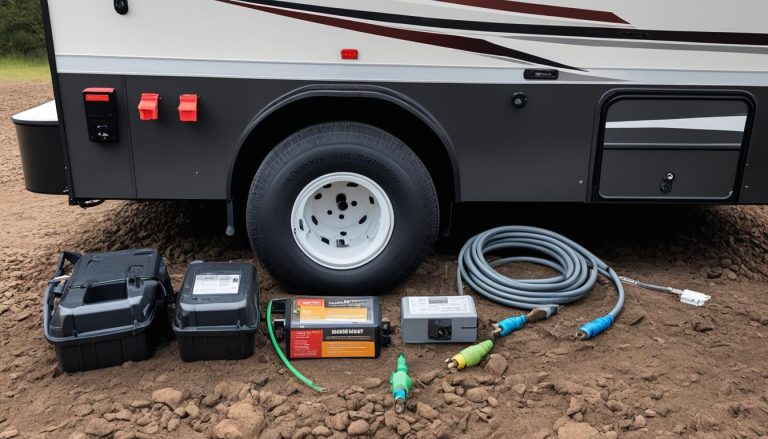Build Your RV Park: Essential Steps to Success
gorvlifestyle.com and its partners may earn a commission if you purchase a product through one of our links
Building an RV park can be a rewarding venture for those interested in the recreational vehicle industry. With a growing market of RV enthusiasts and a high return on investment, it’s important to understand the key steps to success. This section will provide a comprehensive guide to help you plan, design, develop, and construct your own RV park.
Key Takeaways:
- Learn the essential steps to build a successful RV park
- Understand the RV park industry and conduct thorough research
- Choose the ideal location and offer attractive amenities
- Hire efficient personnel and provide excellent customer service
- Create compelling marketing strategies to attract customers
- Calculate the costs involved in building and running an RV park
Understand the RV Park Industry In-Depth
Before embarking on your RV park business venture, it is essential to have a deep understanding of the industry. Conducting thorough research, seeking professional advice, and gathering insights from potential customers will provide you with valuable knowledge that can increase your chances of success. Here are some key aspects to consider:
Conducting RV Park Research
Start by conducting comprehensive research on the RV park industry. Explore existing RV parks in your target market to gain insights into their business models, amenities, and pricing structures. This research will help you identify any gaps in the market that you can capitalize on to differentiate your park.
Seeking Professional RV Park Investment Advice
Consulting with industry experts and professionals can provide you with invaluable guidance and advice. Experienced consultants can offer insights into market trends, financial planning, and operational strategies specific to the RV park industry, helping you make informed decisions and avoid common pitfalls.
Gathering Insights from Potential Customers
Speaking directly with potential RV park guests can provide valuable insights into their needs, preferences, and expectations. Consider running surveys or focus groups to gather feedback on amenities, pricing, location preferences, and other factors that can influence the success of your park. This information will help you tailor your park to meet the demands of your target market.
Understanding the Inner Workings of the RV Park Business
In addition to market research and customer insights, it is crucial to understand the inner workings of the RV park business. This includes obtaining necessary permits and licenses, complying with zoning regulations, installing essential facilities like water, electricity, and sewage systems, and ensuring compliance with health and safety standards. Familiarize yourself with these requirements to ensure a smooth and successful venture.
By thoroughly understanding the RV park industry and taking the time to conduct proper research and seek professional advice, you can increase your chances of building a successful and profitable RV park.
Find the Ideal Location
The location of your RV park is a crucial factor in attracting guests and ensuring their satisfaction. Consider the following key aspects when choosing the ideal location:
RV Park Location
Look for a location that offers a pleasant environment for camping enthusiasts. Choose an area with good weather conditions during the camping season, providing your guests with enjoyable outdoor experiences. A beautiful natural setting with scenic views, such as mountains, lakes, or forests, can further enhance the appeal of your RV park.
Campground Location
Proximity to popular local events, attractions, and amenities is also important. Consider locating your RV park near popular tourist destinations, national parks, theme parks, or beaches. This allows your guests to easily access recreational activities, sightseeing opportunities, and entertainment options, creating a memorable experience for them.
RV Park Amenities
Investing in a variety of amenities can make your RV park even more appealing to guests. Consider offering park model cabins, spacious RV lots with full hook-ups, clean restrooms and showers, well-maintained trails for hiking or biking, and pet-friendly areas. Additionally, amenities like swimming pools, outdoor theaters, fitness centers, and picnic areas can add to the overall enjoyment of your guests’ stay.
Proximity to Attractions
Ensure that your RV park is conveniently located near popular attractions and recreational activities. This will save your guests time and travel expenses while allowing them to make the most of their vacation. Consider providing information about nearby attractions, restaurants, shopping centers, and outdoor activities to help your guests plan their itinerary.
By carefully choosing the location of your RV park and considering the factors mentioned above, you can attract more guests and provide them with a memorable camping experience.

| Benefits of Ideal Location | Attractions |
|---|---|
| Beautiful natural setting | National parks |
| Good weather conditions | Theme parks |
| Proximity to local events | Beaches |
| A variety of amenities | Recreational activities |
Hire Efficient Personnel
A key aspect of running a successful RV park is hiring efficient personnel. The RV park staff, also known as work campers, are responsible for ensuring the smooth operation of the park and providing excellent customer service to guests.
Work campers play an essential role in maintaining clean facilities and creating a welcoming atmosphere for visitors. Their dedication and professionalism are crucial in making guests feel comfortable and satisfied throughout their stay.
Providing Top-Notch Customer Service
Customer service is paramount in the RV park industry. Work campers should be friendly, approachable, and knowledgeable about the park’s amenities and local attractions. They should be ready to assist guests with any inquiries, offer guidance on recreational activities, and provide recommendations for nearby restaurants or shops.
By going the extra mile to ensure customer satisfaction, RV park staff can create a positive experience for guests and encourage them to return in the future. This emphasis on customer service fosters a sense of loyalty and word-of-mouth recommendations, which can significantly impact the success of the RV park.
Organizing Engaging RV Park Activities
RV parks are not just a place to park and rest; they are also an opportunity for guests to engage in various recreational activities. The RV park staff can organize exciting events, such as sporting tournaments, game nights, or community gatherings, to enhance the overall guest experience.
Organized activities like team-building exercises or outdoor movie nights create a sense of camaraderie among guests and promote a lively and vibrant community within the park. This fosters a unique selling point for the RV park, attracting more visitors and increasing customer satisfaction.
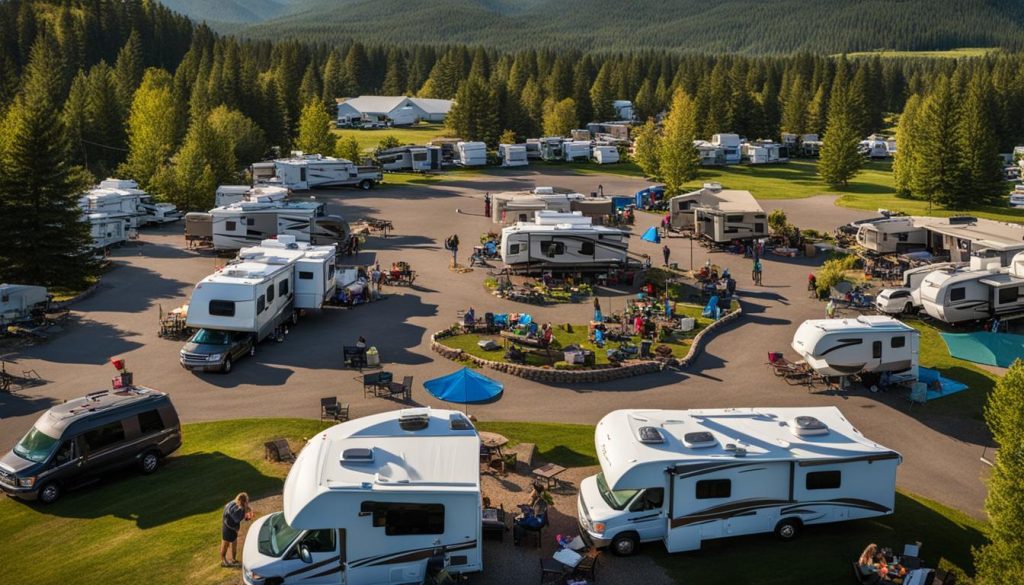
Recruiting and Training Efficient Work Campers
When hiring RV park staff, it’s essential to seek individuals who are passionate about customer service and have a genuine interest in the RV lifestyle. Look for candidates who possess excellent interpersonal skills, are detail-oriented, and have a strong work ethic.
Providing comprehensive training to work campers is crucial for ensuring they are equipped with the necessary skills and knowledge to perform their duties effectively. Training should cover customer service techniques, facility maintenance, and emergency protocols to ensure the highest level of service and safety for guests.
| Benefits of Hiring Efficient RV Park Staff | Impact on RV Park Success |
|---|---|
| Enhanced customer satisfaction | Positive online reviews and word-of-mouth recommendations |
| Increased guest retention | Higher occupancy rates |
| Wealth of local knowledge to assist guests | Improved guest experience and engagement |
| Effective facility maintenance and cleanliness | Positive first impression for guests |
Investing in the recruitment and training of efficient work campers is instrumental in establishing a thriving RV park. Their dedication to providing outstanding customer service and organizing engaging activities ensures a memorable experience for guests, fosters repeat visits, and contributes to the overall success of the park.
Create Compelling Marketing Strategies
Marketing plays a crucial role in the success of any business, and RV parks are no exception. To drive bookings and attract a steady flow of guests, it’s important to implement effective marketing strategies that target your ideal audience. Here are some key steps to take:
1. Utilize Social Media Platforms
Social media is a powerful tool for RV park marketing. Create engaging and shareable content to showcase the unique features and experiences your park offers. Share stunning visuals of your park, RV sites, and amenities to capture the attention of potential visitors. Encourage guests to tag your park in their posts and use relevant hashtags to expand your reach.
Take advantage of platforms like Facebook, Instagram, and Twitter to interact with your audience, share updates, and run targeted ad campaigns. Engage in online conversations, respond to queries promptly, and leverage user-generated content to build trust and credibility.
2. Create a User-Friendly Booking Platform
A seamless booking experience is crucial for converting potential guests into bookings. Invest in a user-friendly and mobile-responsive website that allows visitors to easily browse RV site options, amenities, and availability. Implement a secure and efficient online booking system that enables guests to make reservations with just a few clicks.
By providing a hassle-free booking process, you can attract more guests and encourage return visits. Incorporate customer reviews and testimonials on your booking platform to instill confidence in your park’s quality and services.
3. Stay Up-to-Date with New Trends
The digital marketing landscape is constantly evolving. Stay abreast of the latest trends and adapt your marketing strategies accordingly. Explore emerging platforms and technologies that can effectively target your audience and drive engagement.
For example, consider incorporating influencer marketing campaigns where social media influencers promote your park to their dedicated followers. Engage with travel bloggers and vloggers who specialize in RV experiences, adventure travel, and lifestyle content.
4. List Your Park with State Associations
Listing your RV park with state associations and directories can significantly boost your visibility and attract potential guests. Many RV enthusiasts rely on these resources to discover new parks and plan their trips. Ensure your park’s information is up-to-date, including amenities, pet policies, and special offers.
By partnering with campground franchises like KOA (Kampgrounds of America) or Good Sam Club, you can expand your reach and tap into their established customer base. These affiliations enhance your credibility and provide an additional marketing platform to reach potential guests.
Here’s a visual representation of these marketing strategies:
| Marketing Strategies | Benefits |
|---|---|
| Utilize social media platforms | Increased brand awareness and engagement |
| Create a user-friendly booking platform | Improved customer experience and higher conversion rates |
| Stay up-to-date with new trends | Relevant and innovative marketing approaches |
| List your park with state associations | Expanded visibility and access to potential guests |
Calculate the Costs
When venturing into the world of RV park ownership, it’s crucial to understand the associated costs. To ensure a successful and profitable venture, you need to consider various expenses involved in the process.
Firstly, there are the startup costs, which include land acquisition and permits. Depending on the location and size of your desired RV park, the cost of purchasing land can vary significantly. Additionally, obtaining the necessary permits from local authorities is essential to ensure compliance with regulations.
Next, there are the development costs. This includes site development, infrastructure, and amenities. Building the necessary infrastructure like water, electricity, and sewage systems are key components of a well-functioning RV park. You’ll also need to consider the costs of amenities like picnic areas, playgrounds, and laundry facilities to attract and accommodate guests.
One significant cost to factor in is the septic system installation. Proper waste management is vital for the smooth operation of an RV park. The cost of installing a septic system will depend on the size and capacity required to handle the park’s demand.
Lastly, don’t forget the ongoing operational costs. From maintenance and landscaping to staff wages and utilities, these costs can impact your profitability. Evaluating these expenses and creating a comprehensive budget is crucial for the long-term success of your RV park.
FAQ
How do I build an RV park?
Building an RV park involves several key steps, including conducting thorough research, obtaining necessary permits, selecting a suitable location, designing the park layout, constructing necessary infrastructure, and hiring efficient personnel.
What should I know about the RV park industry?
Before starting an RV park, it’s important to understand the industry in-depth by conducting research, seeking professional advice, and gathering insights from potential customers. This will help you make informed decisions and stay ahead in the competitive market.
How do I find the ideal location for my RV park?
When choosing a location for your RV park, consider factors like good weather during the camping season, proximity to popular local events or water bodies, and availability of attractions nearby. Including amenities like park model cabins, swimming pools, and fitness centers can also enhance the appeal of your park.
Who should I hire for my RV park?
Hiring efficient personnel, such as work campers, is crucial for running a successful RV park. Work campers are responsible for daily activities and maintaining clean facilities. Providing excellent customer service and organizing engaging activities can help create a positive experience for guests.
How can I market my RV park effectively?
To effectively market your RV park, utilize social media platforms, create a user-friendly booking platform, and stay updated with new trends. Setting up a business website and listing your park with state associations can also help attract customers. Promoting your park’s amenities and creating compelling marketing strategies will help you stand out from competitors.
What are the costs associated with building an RV park?
Building an RV park involves various costs, including land acquisition, permits, infrastructure development, and ongoing operational expenses. Consider expenses such as land purchase, site development, septic system installation, and maintenance costs. Understanding the financial aspect of building and running an RV park is crucial for budgeting and ensuring profitability.

